- Home
- Patrick Rothfuss
The Name of the Wind tkc-1 Page 10
The Name of the Wind tkc-1 Read online
Page 10
I don’t mean to imply that the road was always smooth. The same curiosity that made me such an eager student also led me into trouble with fair regularity.
One evening as I was building up my parent’s cookfire, my mother caught me chanting a rhyme I had heard the day before. Not knowing that she was behind me, she overheard as I knocked one stick of firewood against another and absentmindedly recited:
“Seven things has Lady Lackless
Keeps them underneath her black dress
One a ring that’s not for wearing
One a sharp word, not for swearing
Right beside her husband’s candle
There’s a door without a handle
In a box, no lid or locks
Lackless keeps her husband’s rocks
There’s a secret she’s been keeping
She’s been dreaming and not sleeping
On a road, that’s not for traveling
Lackless likes her riddle raveling.”
I had heard a little girl chant it as she played hop-skip. I’d only heard it twice, but it had stuck in my head. It was memorable, as most child rhymes are.
But my mother heard me and came over to stand by the fire. “What were you just saying, sweet?” Her tone wasn’t angry, but I could tell she wasn’t pleased either.
“Something I heard back in Fallows,” I said evasively. Running off with town children was a largely forbidden activity. Distrust turns quickly to dislike, my father told new members of our troupe, so stay together when you’re in town, and be polite. I laid some heavier sticks on the fire and let the flames lick them.
My mother was silent for a while, and I was beginning to hope she would leave it alone, when she said, “It’s not a nice thing to be singing. Have you stopped to think what it’s about?”
I hadn’t, actually. It seemed mostly nonsense rhyme. But when I ran it back through my head, I saw the rather obvious sexual innuendo. “I do. I didn’t think about it before.”
Her expression grew a little gentler, and she reached down to smooth my hair, “Always think about what you’re singing, honey.”
I seemed to be out of trouble, but I couldn’t keep from asking, “How is it any different than parts of For All His Waiting? Like when Fain asks Lady Perial about her hat? ‘I heard about it from so many men I wished to see it for myself and try the fit.’ It’s pretty obvious what he’s really talking about.”
I watched her mouth grow firm, not angry, but not pleased. Then something in her face changed. “You tell me what the difference is,” she said.
I hated bait questions. The difference was obvious: one would get me in trouble, the other wouldn’t. I waited a while to make it clear I had given the matter proper consideration before I shook my head.
My mother knelt lightly in front of the fire, warming her hands. “The difference is … go fetch me the tripod, would you?” She gave me a gentle push, and I scampered off to get it from the back of our wagon as she continued, “The difference is between saying something to a person, and saying something about a person. The first might be rude, but the second is always gossip.”
I brought the tripod back and helped her set it over the fire. “Also, Lady Perial is just a character. Lady Lackless is a real person, with feelings that can be hurt.” She looked up at me.
“I didn’t know,” I protested guiltily.
I must have struck a sufficiently piteous figure because she gathered me in for a hug and a kiss, “It’s nothing to cry over, sweet one. Just remember to always think about what you’re doing.” She ran her hand over my head and smiled like the sun. “I imagine you could make it up to both Lady Lackless and myself if you found some sweet nettle for the pot tonight.”
Any excuse to escape judgment and play for a while in the tangle of trees by the roadside was good enough for me. I was gone almost before the words left her mouth.
I should also make it clear that much of the time I spent with Ben was my free time. I was still responsible for my normal duties in the troupe. I acted the part of the young page when needed. I helped paint scenery and sew costumes. I rubbed down the horses at night and rattled the sheet of tin backstage when we needed thunder onstage.
But I didn’t bemoan the loss of my free time. A child’s endless energy and my own insatiable lust for knowledge made the following year one of the happiest times I can remember.
CHAPTER TWELVE
Puzzle Pieces Fitting
Toward the end of the summer I accidentally overheard a conversation that shook me out of my state of blissful ignorance. When we are children we seldom think of the future. This innocence leaves us free to enjoy ourselves as few adults can. The day we fret about the future is the day we leave our childhood behind.
It was evening, and the troupe was camped by the side of the road. Abenthy had given me a new piece of sympathy to practice: The Maxim of Variable Heat Transferred to Constant Motion, or something pretentious like that.
It was tricky, but it had fallen into place like a puzzle piece fitting. It had taken about fifteen minutes, and from Abenthy’s tone I guessed he had expected it to take three or four hours at least.
So I went looking for him. Partly to get my next lesson, and partly so that I could be just a little bit smug.
I tracked him down to my parent’s wagon. I heard the three of them long before I saw them. Their voices were just murmurs, the distant music that a conversation makes when it’s too dim for words. But as I was coming close I heard one word clearly: Chandrian.
I pulled up short when I heard that. Everyone in the troupe knew my father was working on a song. He’d been teasing old stories and rhymes from townsfolk for over a year wherever we stopped to play.
For months it was stories about Lanre. Then he started gathering old faerie stories too, legends about bogies and shamble-men. Then he began to ask questions about the Chandrian… .
That was months ago. Over the last half year he had asked more about the Chandrian and less about Lanre, Lyra, and the rest. Most songs my father set to writing were finished in a single season, while this one was stretching toward its second year.
You should know this as well, my father never let word or whisper of a song be heard before it was ready to play. Only my mother was allowed into his confidence, as her hand was always in any song he made. The cleverness in the music was his. The best words were hers.
When you wait a few span or month to hear a finished song, the anticipation adds savor. But after a year excitement begins to sour. By now, a year and a half had passed and folk were almost mad with curiosity. This occasionally led to hard words when someone was caught wandering a little too close to our wagon while my father and mother were working.
So I moved closer to my parent’s fire, stepping softly. Eavesdropping is a deplorable habit, but I have developed worse ones since.
“… much about them,” I heard Ben say. “But I’m willing.”
“I’m glad to talk with an educated man on the subject.” My father’s strong baritone was a contrast to Ben’s tenor. “I’m weary of these superstitious country folk, and the …”
Someone added wood to the fire and I lost my father’s words in the crackling that followed. Stepping as quickly as I dared, I moved into the long shadow of my parent’s wagon.
“… like I’m chasing ghosts with this song. Trying to piece together this story is a fool’s game. I wish I’d never started it.”
“Nonsense,” my mother said. “This will be your best work, and you know it.”
“So you think there is an original story all the others stem from?” Ben asked. “A historical basis for Lanre?”
“All the signs point to it,” my father said. “It’s like looking at a dozen grandchildren and seeing ten of them have blue eyes. You know the grandmother had blue eyes, too. I’ve done this before, I’m good at it. I wrote “Below the Walls” the same way. But …” I heard him sigh.
“What’s the problem then?”
&n
bsp; “The story’s older,” my mother explained. “It’s more like he’s looking at great-great-grandchildren.”
“And they’re scattered to the four corners,” my father groused. “And when I finally do find one, it’s got five eyes: two greens, a blue, a brown, and a chartreuse. Then the next one has only one eye, and it changes colors. How am I supposed to draw conclusions from that?”
Ben cleared his throat. “A disturbing analogy,” he said. “But you’re welcome to pick my brain about the Chandrian. I’ve heard a lot of stories over the years.”
“The first thing I need to know is how many there actually are,” my father said. “Most stories say seven, but even that’s conflicted. Some say three, others five, and in Felior’s Fall there are a full thirteen of them: one for each pontifet in Atur, and an extra for the capitol.”
“That I can answer,” Ben said. “Seven. You can hold to that with some certainty. It’s part of their name, actually. Chaen means seven. Chaen-dian means ‘seven of them.’ Chandrian.”
“I didn’t know that,” my father said. “Chaen. What language is that? Yllish?”
“Sounds like Tenia,” my mother said.
“You’ve got a good ear,” Ben said to her. “It’s Temic, actually. Predates Tenia by about a thousand years.”
“Well, that simplifies things,” I heard my father say. “I wish I’d asked you a month ago. I don’t suppose you know why they do what they do?” I could tell by my father’s tone that he didn’t really expect an answer.
“That’s the real mystery, isn’t it?” Ben chuckled. “I think that’s what makes them more frightening than the rest of the bogey-men you hear about in stories. A ghost wants revenge, a demon wants your soul, a shamble-man is hungry and cold. It makes them less terrible. Things we understand we can try to control. But Chandrian come like lightning from a clear blue sky. Just destruction. No rhyme or reason to it.”
“My song will have both,” my father said with grim determination. “I think I’ve dug up their reason, after all this while. I’ve teased it together from bits and pieces of story. That’s what’s so galling about this, to have the harder part of this done and have all these small specifics giving me such trouble.”
“You think you know?” Ben said curiously. “What’s your theory?”
My father gave a low chuckle. “Oh no Ben, you’ll have to wait with the others. I’ve sweated too long over this song to give away the heart of it before it’s finished.”
I could hear the disappointment in Ben’s voice. “I’m sure this is all just an elaborate ruse to keep me traveling with you,” he groused. “I won’t be able to leave until I’ve heard the blackened thing.”
“Then help us finish it,” my mother said. “The Chandrian’s signs are another key piece of information we can’t nail down. Everyone agrees there are signs that warn of their presence, but nobody agrees on what they are.”
“Let me think …” Ben said. “Blue flame is obvious, of course. But I’d hesitate to attribute that to the Chandrian in particular. In some stories it’s a sign of demons. In others it’s fae creatures, or magic of any sort.”
“It shows bad air in mines, too,” my mother pointed out.
“Does it?” my father asked.
She nodded. “When a lamp burns with a blue haze you know there’s firedamp in the air.”
“Good lord, firedamp in a coal mine,” my father said. “Blow out your light and get lost in the black, or leave it burn and blow the whole place to flinders. That’s more frightening than any demon.”
“I’ll also admit to the fact that certain arcanists occasionally use prepared candles or torches to impress gullible townsfolk,” Ben said, clearing his throat selfconsciously.
My mother laughed. “Remember who you’re talking to, Ben. We’d never hold a little showmanship against a man. In fact, blue candles would be just the thing the next time we play Daeonica. If you happened to find a couple tucked away somewhere, that is.”
“I’ll see what I can do,” Ben said, his voice amused. “Other signs … one of them is supposed to have eyes like a goat, or no eyes, or black eyes. I’ve heard that one quite a bit. I’ve heard that plants die when the Chandrian are around. Wood rots, metal rusts, brick crumbles… .” He paused. “Though I don’t know if that’s several signs, or all one sign.”
“You begin to see the trouble I’m having,” my father said morosely. “And there’s still the question as to if they all share the same signs, or have a couple each.”
“I’ve told you,” my mother said, exasperated. “One sign for each of them. It makes the most sense.”
“My lady wife’s favorite theory,” my father said. “But it doesn’t fit. In some stories the only sign is blue flame. In others you have animals going crazy and no blue flame. In others you have a man with black eyes and animals going mad and blue flame.”
“I’ve told you how to make sense of that,” she said, her irritated tone indicating they’d had this particular discussion before. “They don’t always have to be together. They could go out in threes or fours. If one of them makes fires dim, then it’ll look the same as if they all made the fires dim. That would account for the differences in the stories. Different numbers and different signs depending on how they’re grouped together.”
My father grumbled something.
“That’s a clever wife you’ve got there, Arl.” Ben spoke up, breaking the tension. “How much will you sell her for?”
“I need her for my work, unfortunately. But if you’re interested in a short-term rental, I’m sure we could arrange a reas—” There was a fleshy thump followed by a slightly pained chortle in my father’s baritone. “Any other signs that spring to mind?”
“They’re supposed to be cold to the touch. Though how anyone could know that is beyond me. I’ve heard that fires don’t burn around them. Though that directly contradicts the blue flame. It could—”
The wind picked up, stirring the trees. The rustling leaves drowned out what Ben said. I took advantage of the noise to creep a few steps closer.
“… being ‘yoked to shadow,’ whatever that means,” I heard my father say as the wind died down.
Ben grunted. “I couldn’t say either. I heard a story where they were given away because their shadows pointed the wrong way, toward the light. And there was another where one of them was referred to as ‘shadow-hamed.’ It was ‘something the shadow-hamed.’ Damned if I can remember the name though… .”
“Speaking of names, that’s another point I’m having trouble with,” my father said. “There are a couple dozen I’ve collected that I’d appreciate your opinion on. The most—”
“Actually, Arl,” Ben interrupted, “I’d appreciate it if you didn’t say them out loud. Names of people, that is. You can scratch them in the dirt if you’d like, or I could go fetch a slate, but I’d be more comfortable if you didn’t actually say any of them. Better safe than sore, as they say.”
There was a deep piece of silence. I stopped midsneak with one foot off the ground, afraid they’d heard me.
“Now don’t go looking at me like that, either of you,” Ben said testily.
“We’re just surprised, Ben,” came my mother’s gentle voice. “You don’t seem the superstitious type.”
“I’m not,” Ben said. “I’m careful. There’s a difference.”
“Of course,” my father said. “I’d never—”
“Save it for the paying customers, Arl,” Ben cut him off, irritation plain in his voice. “You’re too good an actor to show it, but I know perfectly well when someone thinks I’m daft.”
“I just didn’t expect it, Ben,” my father said apologetically. “You’re educated, and I’m so tired of people touching iron and tipping their beer as soon as I mention the Chandrian. I’m just reconstructing a story, not meddling with dark arts.”
“Well, hear me out. I like both of you too well to let you think of me as an old fool,” Ben said. “Besides, I have somethi
ng to talk with you about later, and I’ll need you to take me seriously for that.”
The wind continued to pick up, and I used the noise to cover my last few steps. I edged around the corner of my parents’ wagon and peered through a veil of leaves. The three of them were sitting around the campfire. Ben was sitting on a stump, huddled in his frayed brown cloak. My parents were opposite him, my mother leaning against my father, a blanket draped loosely around them.
Ben poured from a clay jug into a leather mug and handed it to my mother. His breath fogged as he spoke. “How do they feel about demons off in Atur?” he asked.
“Scared.” My father tapped his temple. “All that religion makes their brains soft.”
“How about off in Vintas?” Ben asked. “Fair number of them are Tehlins. Do they feel the same way?”
My mother shook her head. “They think it’s a little silly. They like their demons metaphorical.”
“What are they afraid of at night in Vintas then?”
“The Fae,” my mother said.
My father spoke at the same time. “Draugar.”
“You’re both right, depending on which part of the country you’re in,” Ben said. “And here in the Commonwealth people laugh up their sleeves at both ideas.” He gestured at the surrounding trees. “But here they’re careful come autumn-time for fear of drawing the attention of shamble-men.”
“That’s the way of things,” my father said. “Half of being a good trouper is knowing which way your audience leans.”
“You still think I’ve gone cracked in the head,” Ben said, amused. “Listen, if tomorrow we pulled into Biren and someone told you there were shamble-men in the woods, would you believe them?” My father shook his head. “What if two people told you?” Another shake.

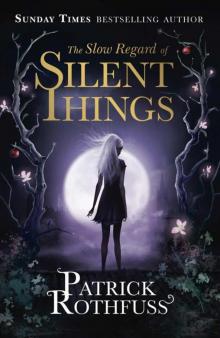 The Slow Regard of Silent Things
The Slow Regard of Silent Things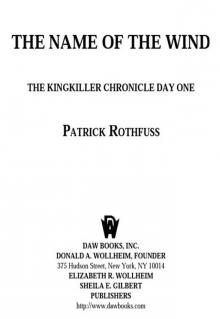 The Name of the Wind
The Name of the Wind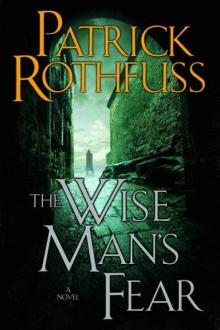 The Wise Man's Fear
The Wise Man's Fear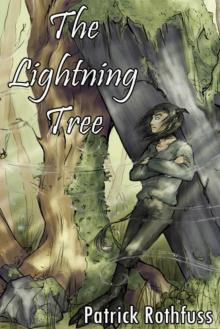 The Lightning Tree
The Lightning Tree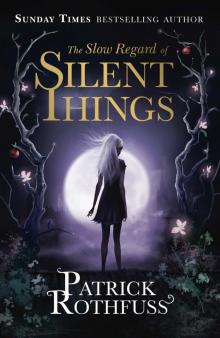 The Slow Regard of Silent Things: A Kingkiller Chronicle Novella (The Kingkiller Chronicle)
The Slow Regard of Silent Things: A Kingkiller Chronicle Novella (The Kingkiller Chronicle)![Kingkiller Chronicle [01] The Name of the Wind Read online](http://i1.bookreadfree.com/i/03/24/kingkiller_chronicle_01_the_name_of_the_wind_preview.jpg) Kingkiller Chronicle [01] The Name of the Wind
Kingkiller Chronicle [01] The Name of the Wind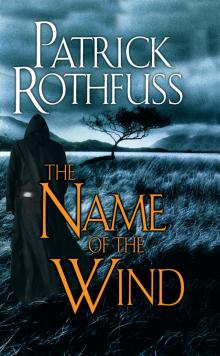 The Name of the Wind tkc-1
The Name of the Wind tkc-1